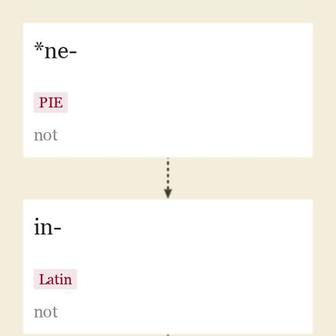inveigh (v.)
15世纪晚期,也曾称为 enveigh,意为“引入”,源自拉丁语 invehere,意为“带入,引入,介绍”,也意味着“攻击,袭击”,源自 in- “反对”(见 in-(1))和 vehere “携带”(源自 PIE 词根 *wegh- “行进,移动,在车辆中运输”)。意为“发泄激烈的谴责”始于1520年代,源自拉丁语的第二义(见 invective)。相关词汇: Inveighed; inveighing。
inveigh 的相关词汇

这个词缀的意思是“不,相反,没有”(也可以是通过与后面的辅音音节化的 -n- 的同化而来的 im-, il-, ir-,这种趋势始于后期拉丁语),源自拉丁语 in- “不”,与希腊语 an-,古英语 un- 同源,均来自 PIE 词根 *ne- “不”。
在古法语和中古英语中,通常使用 en-,但大多数这些形式在现代英语中已经不再使用,只有极少数(例如 enemy)不再被视为否定的。在英语中的经验法则是,对于明显的拉丁语元素使用 in-,对于本土或本土化的元素使用 un-。
"言辞攻击",1520年代,源自中世纪拉丁语 invectiva "辱骂的言辞",来自晚期拉丁语 invectivus "辱骂的,责骂的",源自 invect-, invehere 的过去分词词干 "带入,引入",也指"攻击,袭击",源自 in- "反对"(参见 in-(1))+ vehere "携带"(源自 PIE 词根 *wegh- "去,移动,用车辆运输")。有关用法的细微差别,请参见 humor(名词)。英语中更早的名词形式是 inveccion(15世纪中叶),而 invective(形容词)出现在中古英语中。
原始印欧语根词,意为“走,移动,用车辆运输”。
The root wegh-, "to convey, especially by wheeled vehicle," is found in virtually every branch of Indo-European, including now Anatolian. The root, as well as other widely represented roots such as aks- and nobh-, attests to the presence of the wheel — and vehicles using it — at the time Proto-Indo-European was spoken. [Watkins, p. 96]
这个词根 wegh-,“尤其是用轮式车辆运输”,在几乎所有印欧语系的分支中都有出现,包括现在的安纳托利亚语。这个词根以及其他广泛代表的词根,如 aks- 和 nobh-,证明了在原始印欧语被使用的时代,轮子和使用轮子的车辆已经存在。[Watkins, p. 96]
它构成或组成以下单词: always; away; convection; convey; convex; convoy; deviate; devious; envoy; evection; earwig; foy; graywacke; impervious; invective; inveigh; invoice; Norway; obviate; obvious; ochlocracy; ogee; pervious; previous; provection; quadrivium; thalweg; trivia; trivial; trivium; vector; vehemence; vehement; vehicle; vex; via; viaduct; viatic; viaticum; vogue; voyage; wacke; wag; waggish; wagon; wain; wall-eyed; wave (n.); way; wee; weigh; weight; wey; wiggle。
它是以下单词的假设来源/其存在的证据由以下单词提供:梵语 vahati “搬运,运输”, vahitram, vahanam “容器,船”; 阿维斯塔语 vazaiti “他领导,拖”; 希腊语 okhos “马车,战车”; 拉丁语 vehere “搬运,运输”, vehiculum “马车,战车”; 古斯拉夫语 vesti “搬运,运输”, vozŭ “马车,战车”; 俄语 povozka “小雪橇”; 立陶宛语 vežu, vežti “搬运,运输”, važis “小雪橇”; 古爱尔兰语 fecht “战役,旅程”, fen “马车,手推车”; 威尔士语 gwain “马车,手推车”; 古英语 wegan “搬运”; 古诺尔斯语 vegr,古高地德语 weg “道路”; 中古荷兰语 wagen “货车”。